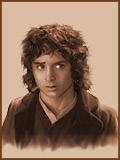
Another part of my report.
Of Kings and Serfs
J.R.R Tolkien lived and worked in 20th century England. He was strongly influenced by traditional English culture. Culture is the customs or usual practices of a people. The English have a culture composed of afternoon tea and social formalities, of pipes and storytelling at the pub. J.RR. Tolkien spent much of his free time with friends at pubs exchanging stories and ideas. Tolkien reflects this aspect of English culture in the characters of his hobbits who enjoy whiling away evening hours at the Green Dragon, telling old tales and sharing a pint or two around the fireplace. As did many English men of his time Tolkien smoked a pipe. In Lord of the Rings, Gandulf the wizard and all of the hobbits smoke pipes.
The hobbits of the Shire represent the common English folk of whom Tolkien was so fond. They are simple farmers and tradesmen. They mind their own business and are generally undisturbed by what happens in the outside world. Tolkien grew up with these kinds of people in a village much like Hobbitton. Although he was forced to leave his simple home to attend school he never forgot his country upbringing and revived childhood memories through the Shire.
High or upper class English culture is portrayed in the Elves They speak a language very similar to old English. They are very formal in their social interactions and are older and wiser then many of the other inhabitants of Middle Earth. The elves were the first creations of the gods, the valar. Because of their age the elves had a knowledge not possessed by men or hobbits. When beginning their quest Frodo and his companions went to Elrond, an elf lord, for counsel. (Tolkien, J.R.R. The Lord of the Rings. 50th Anniversary Edition. New York: Houghton Mifflin Company, 2004. Print.) Both the hobbits and the Elves share a love of gardening like the English.
The English monarchy is also given a place in the story through the men of Rohan and Gondor who are governed by kings. They do not resent being governed by hierarchy but loyally obey and defend them. It is part of their heritage and makes them proud of who they are.
Language was for J.R.R Tolkien the heart of culture. Through language we are able to transmit ideas and beliefs to future generations and thus preserve our identity. Tolkien saw that languages were diminishing. Of the 10,000 languages that once existed in the world only 6,000 are still used today. Tolkien saw the disappearance of languages as a decline of culture in general. This is reflected in Lord of the Rings through the fading of the elves, dwarfs and ents. As the Fourth Age begins these ancient peoples slowly disappear. One of the signs of their decline is the disappearance of their languages. Knowledge of them becomes little known and they are replaced by the common tongue. ("National Geographic, Lord of the Rings, The Return of the King.” National Geographic Society. National Geographic, 2009. Web. 4 May 2010.) In our own world we see many dialects becoming extinct and being replaced with internationally known vernacular such as Spanish and English.








No comments:
Post a Comment